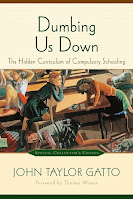 |
| (Amazon UK link) |
Although he’s a school teacher in the United States, he has challenged many of the principles of state classroom education, and this little book of his has become something of a classic. While our sons are now grown up and we’re thus past this stage, I was very pleased when I spotted the book on one of my friend’s shelves, and borrowed it at once.
‘Dumbing us down’ is subtitled, ‘The hidden curriculum of compulsory schooling’. It consists of the text of five speeches that the author has made. One of them, perhaps the most radical, was somewhat ironically his acceptance speech after being given an award by his state for being ‘teacher of the year’.
The first chapter - or speech - however, is probably the most thought-provoking. Entitled, ‘The seven-lesson school teacher’, it outlines what the author perceives as the ‘lessons’ taught across the nation, no matter what the subject, and no matter what the student’s age or ability. The first lesson he mentions, for instance, is ‘confusion’ - the non-connectedness of everything. I could see what he meant: in a typical day a child might spend learn about fractions, then the water cycle, then Ancient Egypt… each in a forty-minute slot, unrelated to what came before or afterwards.
On the other hand, I don’t think that UK schools are quite as bad as Gatto describes in the US. His second lesson, ‘Class position’, is something I didn’t really relate to. Until secondary school, I don’t remember having grades at all, and little idea of who was ‘good at’ any particular subject. Even at secondary school we weren’t supposed to tell others what marks we were given, and it wasn’t until end-of-year exams that we saw any kind of comparison to others.
Still, there was a great deal in this and the other essays which I found relevant and, sadly, increasingly true as governments try to impose more and more restraints and requirements on schools. Gatto argues that there are serious problems with the lack of privacy in schools and the need to learn what teachers decide rather than according to the student’s interests.
He points out, too, that no more than about 100 hours - around two hours per week for a year - is necessary for a child to acquire full fluency in reading, or the ability to do most of the maths that’s taught through the primary and early secondary years. Seven or eight hours of schooling per day for twelve or thirteen years is far more than is needed from an educational point of view.
It’s very easy for home educating parents to form a clique, as if ‘against’ parents whose children are in school, and that’s unfortunate as each group tends to focus on anecdotes and information that strengthens their own position and the decisions they have made. But this book isn’t to attack education or schooling or classrooms as such. Gatto is, after all, a teacher himself. He merely wants to demonstrate the difficulties that can arise with the principle of classroom schooling as we know it, where the student has little say in what he learns. Obviously some schools are a great deal better than others, just as some homes are better than others.
I thought that chapter about networking, communities and families was extremely thought-provoking; the author proposes that schools are at best networks, and that we shouldn’t even try to think of them as communities. This ties in with other books I’ve been reading on entirely different topics, and issues in everyday life. I found myself several times seeing schooling as a metaphor, in some cases, for other aspects of human existence.
Although I read the first quarter of the book - mostly introductions - quite quickly, It took me a few weeks to finish this. Once I got into the essays, after a few pages I found I had to put it down and ponder, as there was so much to think about.
Highly recommended to anyone interested in education, whether at school or at home, and indeed to anyone interested in seeing how government restrictions can cause us to accept something that makes no sense at all when we think about it rationally.
If you're a fan of state schooling, then you'll need to put aside pre-conceived ideas, and be open-minded so as to consider which of the author's points are relevant. Some won't be, but it's still interesting to read about how the system was perceived to Gatto when he was employed as a teacher.
Review copyright 2016 Sue's Book Reviews
Review copyright 2016 Sue's Book Reviews
No comments:
Post a Comment